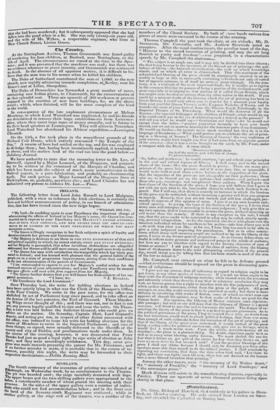IRELAND.
The following letter from Lord John Russell to Lord Mulgrave, published, with a view to influence the Irish elections, is certainly the best and boldest announcement of policy, in one branch of administra- tion, that has been issued since the new reign began.
Whitehall, Itilth July. "My totd—in confiding again to your Excellency the important charge of administering the affairs of Ireland in her Majesty's name, the Queen has com- manded me to express to your Excellency IIEIL MAJESTY'S ENTIRE APPROBA- TION OP YOUR PAST CONDUCT, AND HER DESIRE THAT YOU SHOULD CON. TINTS CO BE GUIDED BY THE SAME PRINCIPLES ON WHICH YOU HAVE BITHITTO ACTED.
"The Queen willingly recognizes in her Irish subjects a spirit of loyalty and devotion towards her person and Govetnment. "Her Majesty is desirous to see them in THE rum. ENJOYMENT of that civil sad political equality to which, by recent statute, THEY ARE EU LLY ENTITLED; and her Majesty is persuaded, that when inoidious distinctions are altogether obliterated, her throne will be still more secure, and her people more truly united. "The Queen has seen with satisfaction the tranquillity which has lately pre. veiled in Ireland ; and has teamed with pleasure that the general habits of the people are in a state of progressive improvement, arising from their confidence in the just administration of the powers of Government. "lain commanded to express to you her Majesty's cordial wishes for the continued success of your administration ; and your Excellency may be assured that your efforts will meet with firm support from her Majesty. "The Queen further desires that you will assure her Irish subjects of her im- pede! protection. " I have, &c. "J. RUSSELL. "His Excellency the Loid- Lieutenant."
Since Thursday last, the writs for holding elections in Ireland have been quietly lying in what was the Clerk of the Hanaper's Office, in the Four Courts. We write in the past tense, for the office was abolished by act of Parliament long since passed, and to take effect on the demise of the last patentee, the Earl of Granard. These blunder. Ing Whigs never thought of this ; and there was not, nor in fact is not yet, any person legally qualified to sign and issue the writs. On Thurs- day, a case was laid before the Solicitor. General, who could give no advice on the matter. On Saturday, Captain Hart, Lord Granard's deputy, and acting pro tem, in respect of other duties connected with the office, was induced to issue his writs for holding elections for the return of Members to serve in the Imperial Parliament ; and two of these things, so signed, were actually delivered to the Sheriffs of the county and city of Dublin, and proclamations made under them. In the course of the evening, however, it was discovered that Peter Snooks had just as good a legal right to sign writs of election as John Hart; and they were accordingly withdrawn. This day, some pro- gress was made towards preparing the patent for Mr. Fitzsimon ; and if no further mistake is made, it is probable that in the course of to- morrow., possibly this night, the writs may be forwarded to their respective destinations.—Dublin Evening Mail.


























 Previous page
Previous page